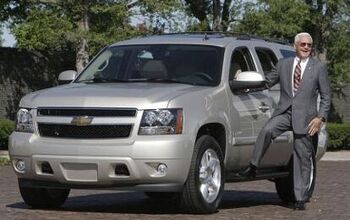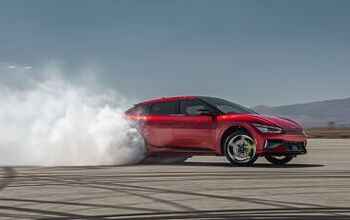Chrysler Suicide Watch 3: Deja Vu All Over Again, Again
With cars and trucks piling up, it’s looking like the Daimler/Chrysler merger/takeover is on the skids. Mergers are always tricky in the auto business. It can work– if both sides put forth an effort. Unfortunately the DCX mess looks rather familiar…
There are three kinds of companies in the automobile industry: mass market manufacturers (e.g. Toyota and GM), niche players (e.g. Subaru or pre-acquisition Saab) and luxury automakers (e.g. BMW or Porsche). The first depend on volume, the second rely on selling a narrow product range at a premium price and the third must unload large numbers of high margin vehicles (or a limited run of extremely profitable products).
Obviously, mass-market makers have the most financial clout. They can afford to buy-up other companies; usually cash-strapped niche makers. Occasionally, one mass-market automaker will absorb a weaker one, either for marketing power or additional production capacity. These acquisitions usually work out– though the smaller party is completely dominated/ annihilated by the buyer (Toyota/Daihatsu, GM/Daewoo, Volkswagen/Skoda, etc). But there’s another type of acquisition: when a “mass-luxury” brand buys up a downtrodden mass-market player. BMW tried it, and the results were disastrous.
In the early 1990s, automakers were flush with cash. BMW, one of the smallest independent world producers, was feeling vulnerable. (Car sales move in cycles; the lower end of the luxury market is always vulnerable to shrinking demand.) Without entries in the mass market, BMW felt a need to get in with a volume manufacturer. They approached Honda about a partnership– and were rebuffed. Barely changing tack, BMW went after the closest thing to Honda they could find: Rover.
The Rover Group was comprised of the remnants of several famous British carmakers. The company had been struggling since the late ‘60’s. It was on government life-support through the ‘70’s and ‘80’s. At the time of sale, British Aerospace owned Rover (they bought it for a song from the British Government). It was profitable. Yes but– a closer examination should have set off alarms.
By then, Rover was selling tarted-up Hondas to counter their loss of market share. It no longer had the manufacturing capacity, overseas dealers or engineering staff to play in the mass market. BMW thought they were buying a cut-price Ford. What they got was a second-rate Acura.
After buying Rover from British Aerospace (and ousting Honda), BMW got down to cases and discovered just how deep the rot was. Rover’s only remaining mass-market cars were over 10 years old (and had never been world-beaters). The Honda-based units slotted just below BMW’s existing line, and several were due for replacement. Land Rover was at least famous and profitable, but quality problems were rife. Instead of being a window into the mid-market, Rover became a money-pit.
After a few years, BMW took the new MINI and ran. They sold Land Rover to Ford and “gave” the other new car– an up-market sedan called the Rover 75– to a group of investors along with a large “loan.” In the end, Rover died, Ford got Land Rover (still with quality issues) and BMW got one nice selling niche car with an English factory to match– but no mass-market presence and huge financial losses.
Daimler’s purchase of Chrysler is eerily reminiscent of Bimmer’s British misadventure. At the time of purchase, the “Crisis Corporation” and Rover both had shrunken market share, with profits depending on a few up-market vehicles. Neither had significant fleet or foreign sales (though being confined to the US market beats being stuck in England). Both had profitable niche off-road makers in tow. Both even had a Japanese “partner” (though Rover was dependent on Honda, Mitsubishi leaned on Chrysler). Neither company had a significantly profitable presence in the heart of their home market.
Once bought, Chrysler developed a “hot” set of cars in high-end niches (the new 300 triplets) using previous-generation Mercedes technology. And then… nicht mehr. Although Chrysler and Mercedes will continue to share “unseen” parts and back office functions (until they don't), cross-brand platform sharing has been declared verboten. "A Mercedes will remain a Mercedes,” Daimler Chrysler’s head of development told a German union gathering yesterday. “And may not share a platform with anyone [save Maybach]."
Thus the new Chrysler Sebring is based on a warmed-over Mitsubishi platform, the company’s getting slaughtered in the small car market, the once profitable minivan segment is shrinking for want of innovative product and Dodge’s truck market is under siege (and just got news of layoffs). Through all this, despite their investment, Germany seems happy to watch its US “equal” tie an American made noose around its neck. In fact, it’s only a matter of time before Chrysler’s German masters sell off Jeep and/or the whole shooting match.
Of course, there is a wider lesson here: by the time a mass-market automaker is weak enough to be bought it’s too weak to compete. And eventually dies.
More by Andrew Dederer
Latest Car Reviews
Read moreLatest Product Reviews
Read moreRecent Comments
- Wjtinfwb No confusion on my end, Ghost. The Government has zero role in job creation outside of the legitimate opportunities' created by Government going about it's responsibilities, namely keeping the American people and territory safe from foreign intrusion. Of course, they're failing epically at that but that's a different topic. The American free enterprise system is what enables job creation. Government's role is to stay out of the way of that system, but they seem incapable of doing so. Oil & Gas exploration is just one example. If a National Job Policy is what you're looking for, there are other countries that will be happy to accept your application for residency.
- Michael Smith I drive 100-300 miles a day in new BMWs, Mercedes-Benzes, and GM SUVs. Some are already equipped with automatic braking.It's the first thing I turn off when I start the car.I've had experiences where (as the author notes) the system gave false alarms and stabbed the brake pedal, threatening my ability to control the car.Further, every driver encounters situations where, for example, legal following distance must be momentarily compromised in order to avoid a difficult situation. When the system intervenes, it disrupts the driver's plan of action. This can lead to a collision as the driver has to suddenly react not to his surroundings, but to the system.Not only is automatic braking an insult to skilled drivers, it's dangerous to everyone.
- Dave M. My hipster daughter is greatly into it. We watched the race together this weekend. It was interesting but I'm not devoted to it like she is. She'll be at the Austin race in October.
- Bd2 I'll watch F1 when Kia and/or Hyundai pony (pun intended) up the cash to field a class leading team. Hyundai is leading many series with the Elantra N with it's incredible 350HP Smartstream-R engine.
- Steve Biro There are 24 races on this year’s F1 schedule. And I guarantee you no more than two will be reasonably exciting, Meanwhile, F1’s reception for Andretti reveals the dark underbelly of the sport. I have followed F1 since the 1960s and, frankly, I am running out of interest. I’ll catch a race if it’s convenient but won’t bother DVRing them.


































Comments
Join the conversation
Now I'm going to have to watch Death Race 2000 (1975) just to hear him exclaim "Jesus Chrysler!"
The idea that Eaton & Co. pulled the wool over the eyes of the Daimler management doesn't seem plausible. Warranty claims rates, resale values, product pipeline and such all should have been thoroughly looked at during the due diligence process between the time a letter of intent was signed and the day the deal closed. I've been through such a process in much smaller scale deals than that one and I doubt that such easy to verify data was hidden or ignored.